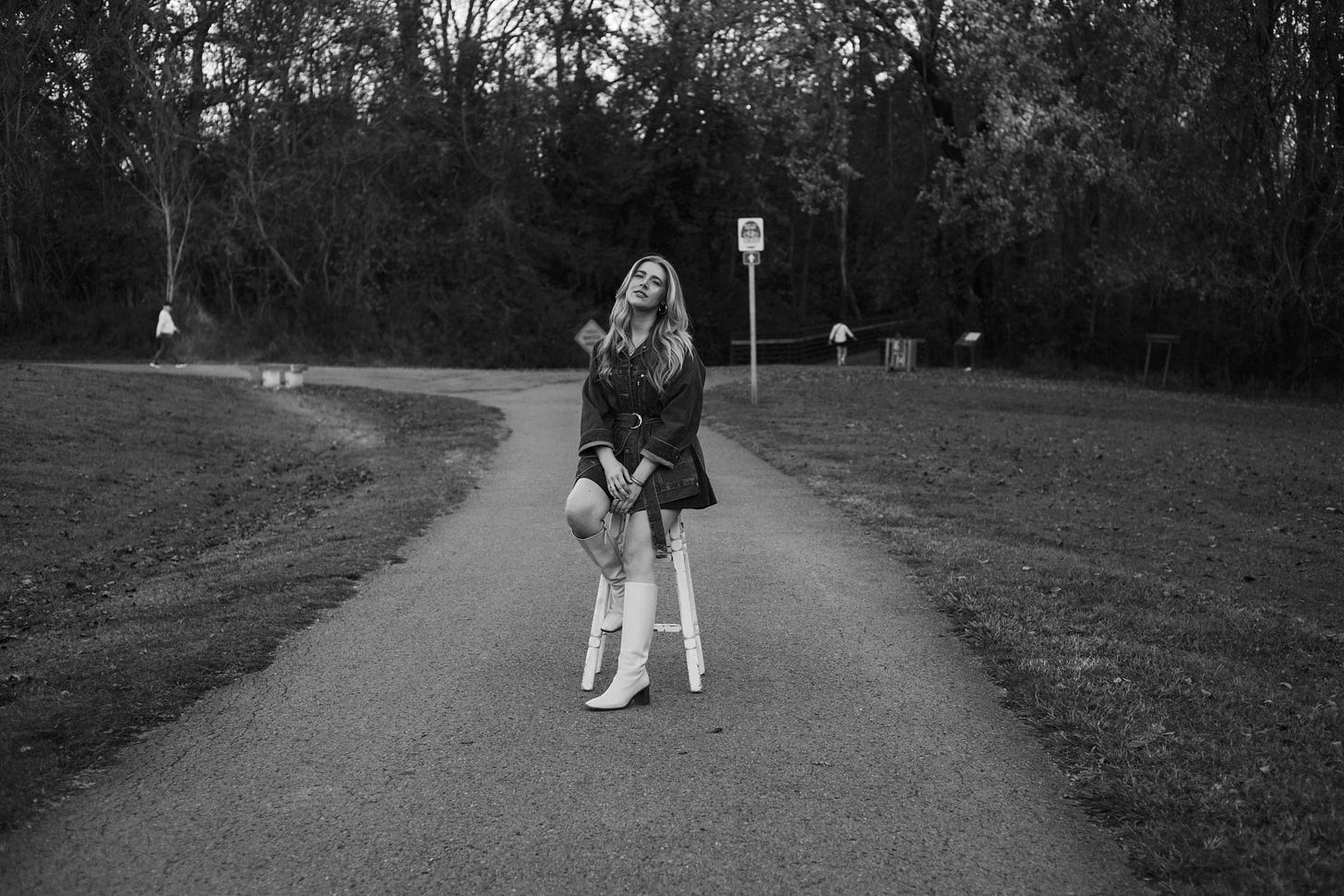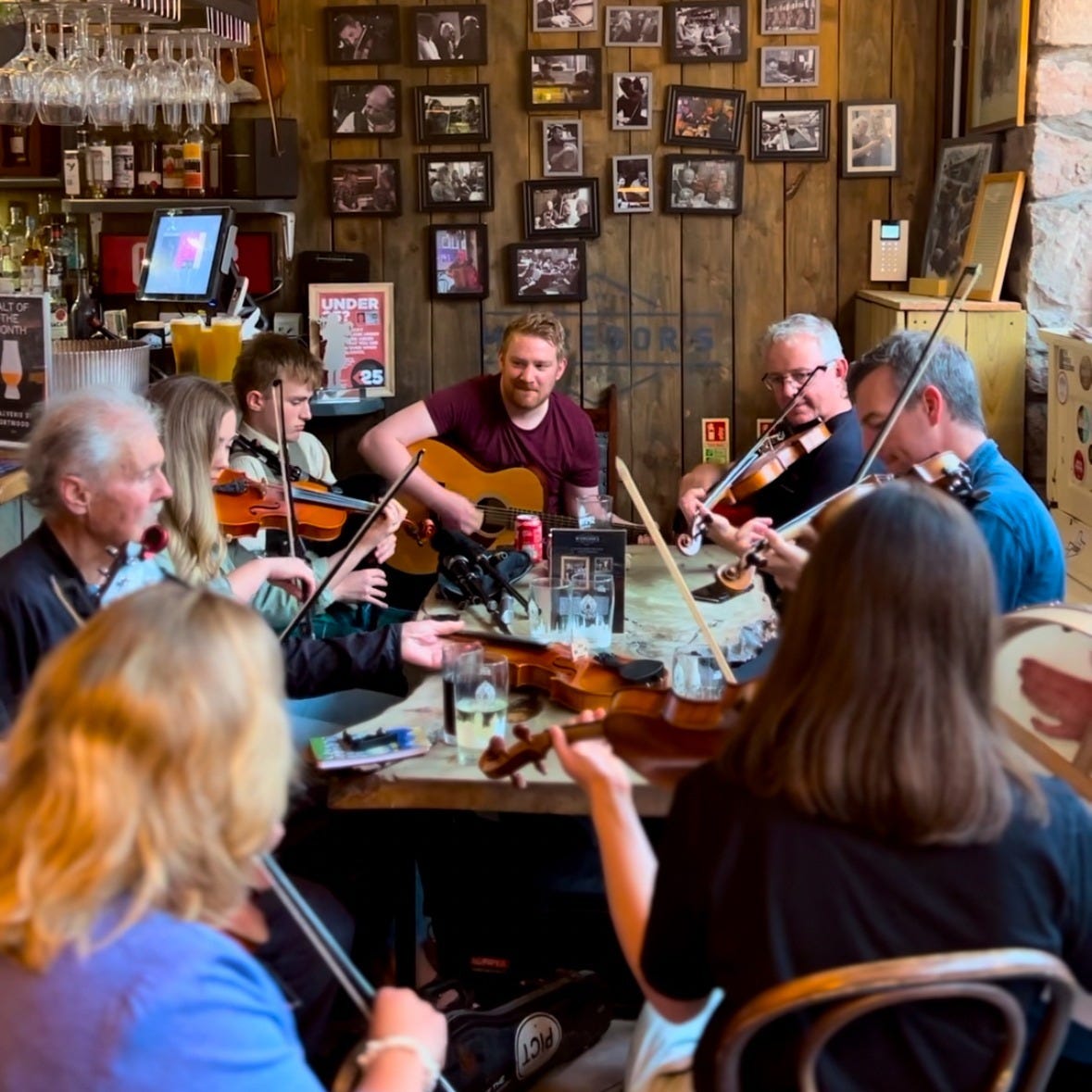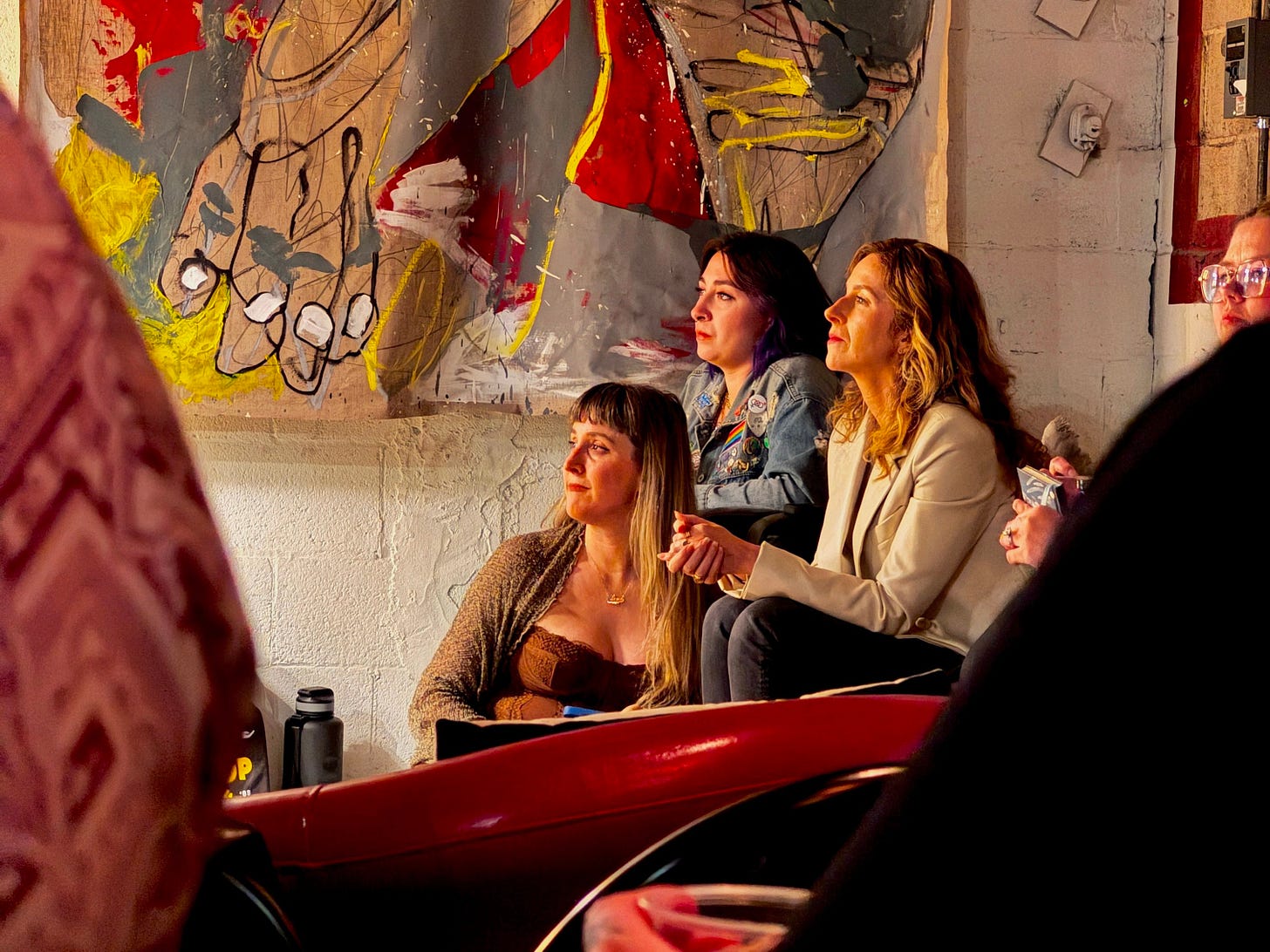After living 50+ places, I ended up back in the South.
On desire paths, the Scottish highlands and Appalachian mountains, and what "the real South" means to me
As I write this, everything I own is in the trunk of my car. Again.
In the past year, I've lived in 25 temporary residences all over the world. That makes for a total of 52 in the two years since I started traveling full-time. I’ve gotten really good at leaving.
This morning, I moved out of the house I’d been subletting for two months.
When it's time to go, I have the routine perfected: grab my toiletries from the bathroom, throw the contents of the dresser into my carry-on, and make a thematically incoherent meal from all my refrigerated groceries.
Strip the bed. Wipe down surfaces. Say a silent prayer for all the plants I have killed. Load up. Lock up. Head out.
When I tallied up the total number of places for this post (of course I have a detailed spreadsheet with every single accommodation), even I was surprised. My friends gasped. I get it. For most people, that level of constant movement sounds exhausting. They want their own space, a home, somewhere to put down roots. But I felt a pull in the opposite direction.
Ever since I was a kid, I wanted my life to feel tiny and transportable. I relish being untethered, tied to nothing and nowhere. My therapist tells me this is a trauma response, but to me it felt like limitless possibility. If I wasn’t tied to anything, I could be anyone.
For so long, it felt like my roots were the thing keeping me stuck.
For the first three decades of my life, I'd followed the default path perfectly.
As a young evangelical Christian, I checked every box: I went to school, got good grades, married young, secured a job, assumed we would start a family. I was born in the South, went to school in the South, and would eventually die in the South.
There was no need to stop and ask where I was going. The destination was clear. Whether I wanted that or not was barely a consideration.
Though I’d spent my entire life in the South, I'd long had a contentious relationship with my Southern identity. I was embarrassed of its legacy, its laws, all the stereotypes of Southerners as backwards and unsophisticated. I was embarrassed of all the ways I was backwards and unsophisticated.
Still, I never seriously considered leaving. The truth was, I was afraid to deviate from the default path, which felt safe and familiar, even if it wasn't actually what I wanted.
And I probably would have continued down that path forever, if not for the saving graces of divorce and deconstruction.
When the marriage ended, my instinct was to flee Nashville immediately.
My friends cautioned: "Lane, with everything else changing, maybe it's not a great time to also move cities."
They knew something I didn't understand quite yet: Choosing a new path would first require knowing where I wanted to go.
What did I want? I had no experience asking that question, much less answering it.
Reluctantly, I stayed in Nashville for another year. I spent every spare minute walking the trails of Shelby Park. On those walks, I noticed the smaller dirt paths that branched off the paved route.
Desire paths are unplanned trails that emerge from repeated travel, the result of people (or animals) taking the most intuitive path, even if it means deviating from the official route. Nature writer Robert Macfarlane describes them as "free-will ways":
"[They are] paths and tracks made over time by the wishes and feet of walkers, especially those that run contrary to design or planning."
What did I want? I must have walked hundreds of miles and countless hours, holding the question loosely in my hand. Eventually my desires finally started to become clearer. Or, at the very least, I knew what I didn't want.
I was tired of feeling stuck.
I was tired of letting fear of the unfamiliar rule my life.
I was tired of following the default path that kept taking me where I didn't want to go.
I knew I needed to uproot myself. Not just from the South, but from that old version of my life, those old beliefs, that default way of living. So I sold my things, moved out of my house, and bought a one-way ticket to Italy.
For the first time, I lived outside of the South.
I felt that familiar thrill of being untethered, another chance for reinvention. I could become a global citizen, from nowhere, belonging everywhere.
Better yet, I could revise my own history, and all the ways it embarrassed me.
Every full-time traveler tells their life story to at least ten new people in each city. Across the 50+ places I lived in those first two years, I perfected mine.
Erasing the South from my story was a convenience at first.
Abroad, people don't usually know North Carolina. Tennessee might get a nod toward Jack Daniels or Dolly Parton, but the recognition rate is still low. Mostly, I started saying "I'm from the U.S." and left it at that.
I liked the anonymity. When I told my story, I smoothed out the textures of the South. Gone were the gas station biscuits, wooden church pews, and bless-your-hearts. Gone, also, were the pieces of my past I was embarrassed of: things I used to believe, wrong-headed ways I used to think.
If new friends eventually did find out where I was from, I took secret pride when they said, "I could never tell. You don't have a Southern accent at all!"
•••
In Mexico, my new friend Kimberly and I went to the market and bought every fruit we didn't recognize.
We sampled them at the kitchen counter while swapping stories. I delivered my typical elevator pitch. Kimberly, a professional storytelling coach, had some notes.
"You tell your story like the South isn't relevant," Kimberly said, dicing jicama. She never minced words, and I liked that about her. "But the South is the whole point. Your story doesn't make sense without the place you came from."
Her comment stopped me in my tracks.
When I thought of the South, I thought only of its worst parts: the legacy of oppression and racism that shapes our politics, laws that strip our rights, the small hateful minority that always seems to have a seat at the table.
I also thought of the ways that I, inadvertently or not, had been complicit in those institutions by ignoring them, benefitting from them, or outright promoting them (see: my young adulthood in the conservative Christian church). I wanted to put as much distance between myself and the South as possible.
So I told my story as though it happened completely detached from a sense of place. This new version of my story was buffed to a perfect shine. It took place in a blank, white void. All the texture, identifying details, and imperfections removed.
But when I stripped all of that away, what was left? No trace of where I came from, or the path I took to get here.
•••
At a bar in Oregon, I got into a drunken argument about the South.
Technically, I was sober. I was sipping a seltzer alongside a group of groggy-eyed drinkers. I'd followed my desire path from Nashville, all the way across the country to the West coast, to the most depressing bar in Eugene, Oregon.
Someone there made an off-handed comment, the familiar kind: dismissing the South as backwards, hand-waving away the millions of people who live there with a single comment.
I felt unexpectedly protective. I'd spent so much of my travels dodging my relationship with the South. Now I was coming to its impassioned defense.
"The South gets equated with its worst parts," I interjected, slamming down my seltzer. "But that's just a small, loud, politically powerful part of the South. Real Southerners are complex, diverse, and creative. The South is the most racially diverse region in the U.S. It's home to the highest percentage of the country’s LGBTQ+ population. There's a vibrant Southern arts, music, and literary culture."
My companions were wide-eyed. This spirited defense surprised even me.
I thought travel would distance me from the South, but the opposite happened. The farther I got from home, the more clearly I saw its mark on me.
I’d begun to notice and appreciate the good parts of my identity that were made by the South: my warmth and hospitality and humor and storytelling that had been baked in since birth.
I'd always associated the South with the most shameful parts of its history — and my own. But now, with the benefit of distance, I had begun to see in a new light: not just its worst parts, but also its complexity and richness, its legacy of art and creativity, of community and inclusion in the face of oppression.
It’s that duality that makes the South what it is. Rather than reducing the South's complexities, or my own, I could exist in them. I could tell the story honestly, good parts and bad, and appreciate how the truth made for a more interesting and compelling story than the smoothed-over version.
As we were leaving the bar, a woman shyly approached me to ask if I could send her an itinerary for a roadtrip across the Southeast.
This fall, I found myself in a pub in Inverness, Scotland.
Cold rain pattered against the windows, but inside was warm and cheery. The small room was packed with people cradling pints and chatting across tables. A group of musicians sat in a corner with their instruments, getting ready to play. I settled into a seat and shed my warm layers.
I'd never heard Scottish music before, but when the fiddle player played the first note, deep recognition reverberated through me. The sound connected me right back to home in the South.
That night, on Hinge of all places, I stumbled across this fact.
The Scottish Highlands and the Appalachian Mountains were once part of the same mountain range. When Scottish settlers arrived in North America during the 18th and 19th centuries, they gravitated toward the Appalachian region.
Rare proof that dating apps are good for something.
The Scots followed their own kind of desire path across the Atlantic. They brought their fiddles and ballads with them, which evolved into the Appalachian fiddle tunes that became a foundation for bluegrass, country, and folk. The music I grew up on.
After two years of traveling, I'd seen how each new city has its own specific textures: the custard tarts and tiles of Portugal, the street art and moles of Oaxaca, the winding streets and olive oil of Italy. These qualities are why I would choose to travel there instead of somewhere else. It's what made them.
Sitting in that Scottish pub, thousands of miles from where I'd grown up, I felt a powerful tether connecting me to my roots. A desire path. Before, it had called me away—to travel, expansion, and new experiences. Now I felt it tugging me back.
After summer and fall in Europe, I returned to Nashville.
It took two years away to learn to love the South again. In November, I sublet a house in my favorite neighborhood. My closest friend lived a few doors down. The best community hour in town is right around the corner. I could walk to Shelby Park.
Out of the 25 places I've lived this year, I ended up being the happiest in the place I'd tried for so long to leave.
This weekend, I attended (and performed at) Never Sent, a gathering of the city's Southern artistic, queer, creative community. It was an intimate, warm, welcoming space like nothing I’d ever experienced: people telling stories about loss, love, rejection and acceptance, radical reconciliation with self and others.
In the green room, folks who were raised their entire lives in the South talked about the new urgency they felt to escape, especially come inauguration day — but also the commitment they felt to this place and its people, a desire to stay and invest, rather than abandon the place that made them.
Last night, I sat around a room with the writing group that has blossomed from the roots I planted in the South a long time ago. We talked about how creative community in Nashville has fundamentally transformed our lives. We talked about the value of investing in building a sense of belonging, rather than leaving. We talked about our faith in the people, not the policies or politics, of the South.
The South isn’t incidental in my story. It’s foundational. It’s what made me.
This realization doesn't erase the bad and shameful parts. Those are part of my story too. But it does promise transformation.
Across all this travel, lots of therapy and reflection, good friendships, and hundreds of miles of walking, I have begun to reclaim my identity from decades of distorting forces and all the wrong-headed ways I used to believe.
Thank goodness I believed that restoration was possible. Thank goodness I had people willing to stay with me and see me through it. It has led to a personal renaissance.
I believe the same thing is possible in the South.
•••
Let me be clear: I'm not planning to settle down any time soon.
I can't give up the inspiration and expansion that full-time travel gives me. But now, I’m also not willing to give up the depth, community, and connection that I get from being back home in the South. I’m most interested in building a life that balances both: one in which roots don’t restrain; they stabilize.
Sometimes, your desire path leads you right back to where you came from. •
Love,
Lane 💋







“I’m most interested in building a life that balances both: one in which roots don’t restrain; they stabilize.” These might be the words I’ve been in search of for a very long time. Enjoyed reading this so much.
Great piece! Loved the term “desire paths.” And the idea of changing your identity to make it easier on others — and the consequence of that — is really nuanced and interesting.